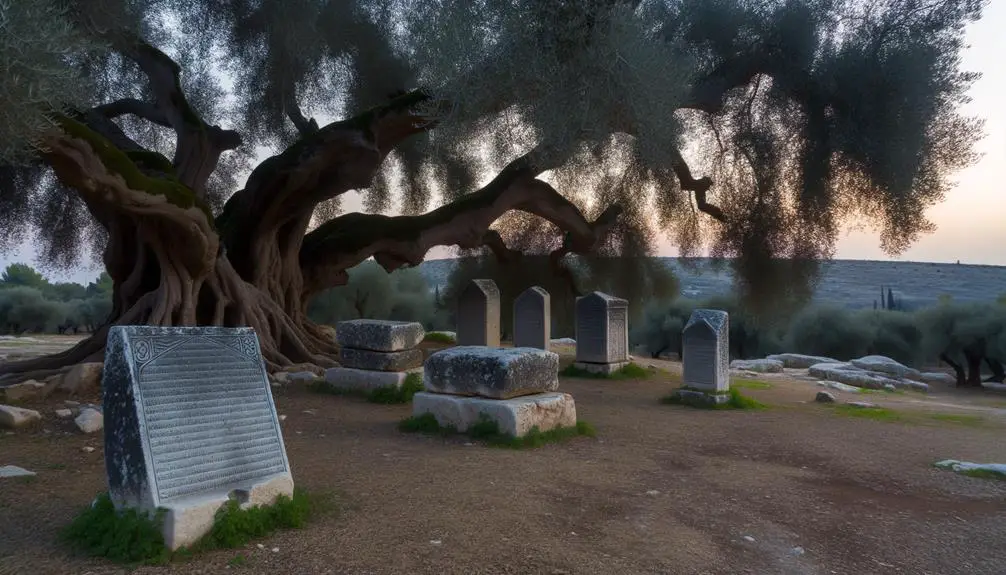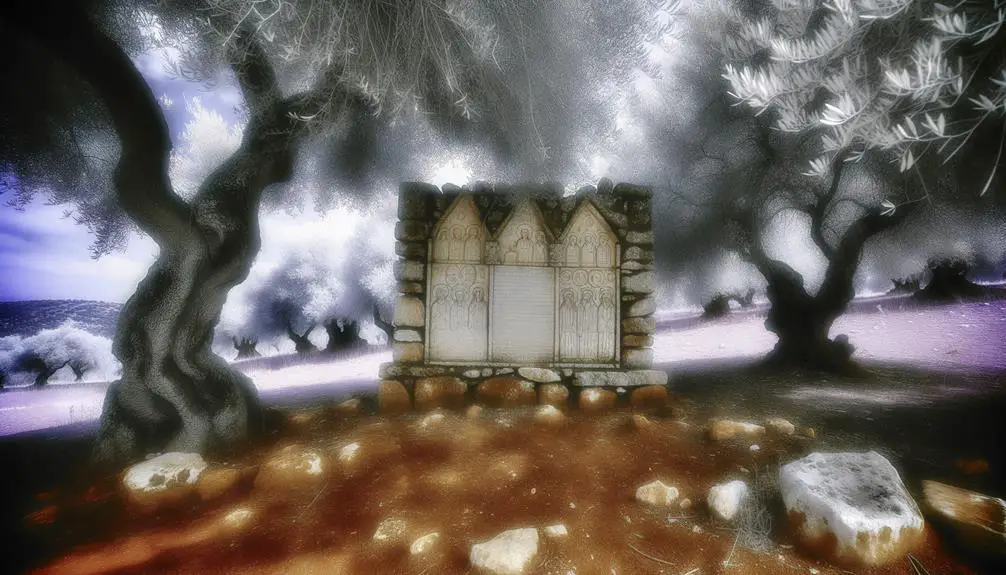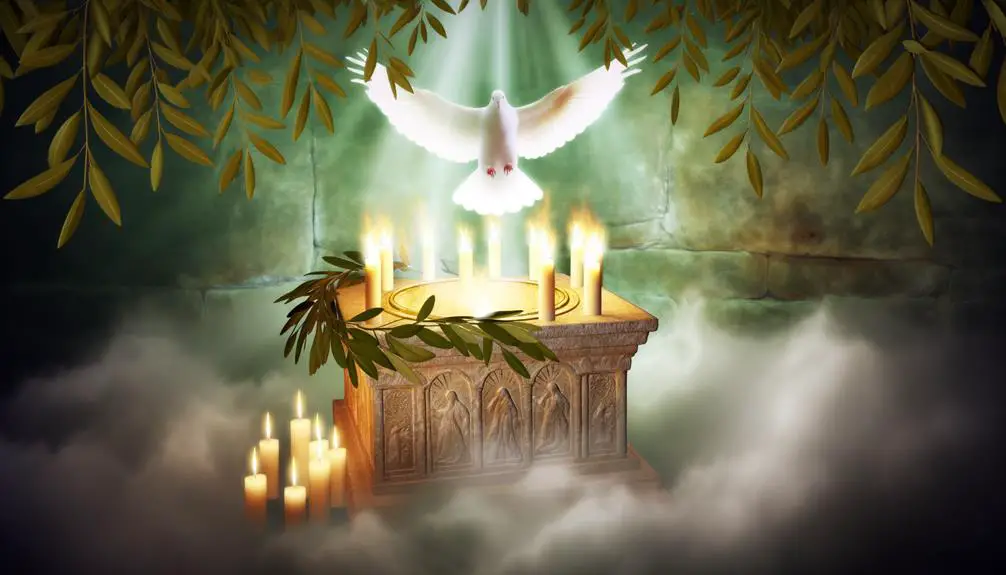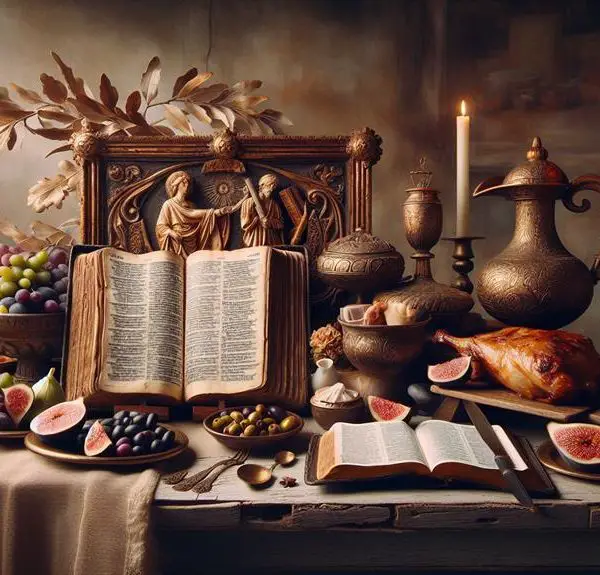Yield to the journey of discovering how biblical memorials serve as profound markers of faith and divine encounters, inviting deeper exploration.

Memorial Meaning in the Bible
As you walk through the garden of Scripture, you'll notice that memorials aren't just stones stacked on the roadside; they're profound markers of divine encounters and promises. These symbols, from ancient altars to the bread and wine of the New Testament, weave a tapestry of remembrance that calls believers to reflect on their faith's roots and the enduring presence of the divine in their lives.
Yet, understanding their full significance requires a bit more than a cursory glance. Let's explore together how these sacred markers from the past illuminate our spiritual journey today, leaving trails of bread crumbs for us to follow into the depths of biblical tradition and meaning.
Key Takeaways
- Memorials in the Bible serve as tangible reminders of God's faithfulness and pivotal moments in history.
- Symbolic elements like stone and earth in memorials convey deep spiritual truths and God's covenantal promises.
- Biblical rituals and ceremonies, such as the Last Supper, embed sacred stories into the daily lives of believers, bridging past and present.
- Contemporary Christian practices of memorial incorporate personal reflection, community unity, and the eschatological hope rooted in New Testament teachings.
Biblical Origins of Memorials

In the Bible, memorials serve as tangible representations of God's enduring faithfulness and pivotal moments in the history of His people. These artifacts, often deeply symbolic, aren't mere historical markers but are imbued with rich theological significance, acting as Covenant reminders. Among these, the Ark of the Covenant stands as a paramount example, encapsulating the Ark's significance in the collective memory and spiritual identity of Israel.
The Ark, beyond its physical construct, was a profound symbol of God's presence, promises, and the relationship He established with His people. It housed the tablets of the Law, Aaron's rod, and manna, each a memorial in itself, reminding Israel of God's guidance, provision, and the foundational covenant established at Sinai. This wasn't merely an artifact of religious importance; it was the embodiment of God's agreement with His people – a tangible reminder of His laws, grace, and the expectations He set forth.
You'll find that the concept of memorials extends beyond the Ark, encompassing various forms of Covenant reminders throughout biblical history. These served as physical manifestations of key moments where God intervened, guided, or covenantally renewed His promises with His people. Whether through stone altars, sacred objects, or even specific practices, each served to anchor the community in their identity as God's chosen and remind them of the obligations and blessings of the covenant.
In analyzing these memorials, it's clear they aren't passive relics but active reminders of faith, identity, and the ongoing relationship between God and humanity. They encapsulate a profound theological truth: God's faithfulness is enduring, and His covenants are everlasting, woven into the very fabric of existence through these memorials.
Symbolism in Stone and Earth

Throughout the biblical narrative, stone and earth emerge as powerful symbols, each meticulously chosen to convey deep spiritual truths and covenantal promises. These elements, deeply embedded in the fabric of the natural world, are elevated to carry profound symbolic weight within the biblical text.
Stone meanings are versatile, serving as enduring reminders of divine encounters and agreements. They can symbolize both the permanence of God's promises and the steadfastness required of His people. Earthly symbols, on the other hand, often represent fertility, mortality, and the promise of divine provision. The earth itself, with its capacity to bring forth life and sustain it, mirrors the creative power and sustenance of God.
Let's explore some key examples of these symbols:
Symbol |
Meaning |
Biblical Reference |
|---|---|---|
Stone |
Covenant |
Genesis 28:18 (Jacob's Pillar) |
Earth |
Fertility & Promise |
Genesis 13:15-17 (Land to Abraham) |
Stone |
Judgment |
Joshua 7:26 (Achan's Memorial) |
These symbols are not just arbitrary; they're chosen with intent. Stones, often unyielding and enduring, are used in memorials (such as Jacob's pillar) to signify the unbreakable nature of God's promises. The earth, with its cycles of death and rebirth, encapsulates promises of fertility and renewal, as seen in the covenant with Abraham.
In examining these symbols, you're invited to understand not just the historical and cultural context in which these texts were written, but also the layers of meaning that these elemental symbols carry. The biblical narrative uses stone and earth not just as physical materials, but as theological statements about God's relationship with His creation.
Rituals as Divine Remembrance

Rituals, transcending mere acts of worship, serve as vital conduits for divine remembrance, embedding sacred stories and covenants directly into the fabric of daily life. Within the biblical narrative, these practices aren't just repetitive actions; they're deeply symbolic, interwoven with the spiritual and communal identity of the faithful. You'll find that sacred spaces and communal ceremonies aren't mere backdrops but active participants in the drama of divine-human interaction.
These rituals, often dictated by divine command, are designed to invoke memory, not just individually but collectively. They ensure that the acts of God aren't lost to the sands of time but are remembered and re-lived by each generation. Sacred spaces, whether tabernacles in the wilderness or temples on mountaintops, stand as physical reminders of the divine presence and promises. They're not just buildings; they're memorials in stone and wood, echoing the covenant between God and His people.
Communal ceremonies, on the other hand, bind individuals into a collective narrative. Through these, you're not merely observing a tradition; you're participating in a story much larger than yourself. These ceremonies bridge the gap between past and present, making ancient truths palpable to the contemporary believer. They remind you that you're part of a continuum, a living history that stretches back to the dawn of faith.
In essence, rituals in the biblical context function as both memory and prophecy. They remember the past, celebrate the present, and anticipate the future, ensuring that the divine narrative is indelibly etched into the communal and individual consciousness.
New Testament Perspectives

Shifting our focus to the New Testament, we observe a profound evolution in the understanding and practice of memorial from the rituals established in the Old Testament. The New Testament introduces a dynamic shift, emphasizing internal reflection and communal remembrance, particularly through the Last Supper significance and Resurrection commemoration.
Here are several key perspectives to understand:
- The Last Supper as a New Covenant: Jesus' Last Supper with his disciples redefines memorial as not merely a remembrance but as an active participation in the New Covenant, symbolized through bread and wine. This act transcends past observances by embedding a spiritual and eternal significance in the practice.
- Resurrection Commemoration: The Resurrection of Jesus becomes a central event for commemoration, symbolizing victory over death and the promise of eternal life. This event shifts the focus from mourning to celebrating the fulfillment of God's promises.
- Personal Reflection and Repentance: The New Testament encourages believers to engage in personal reflection and repentance as part of memorial practices, focusing on the transformative power of God's grace and forgiveness.
- Community and Unity: Memorial practices in the New Testament foster a sense of community and unity among believers, as they gather to remember and proclaim the death and resurrection of Jesus Christ.
- Eschatological Hope: The New Testament memorial practices are imbued with an eschatological hope, looking forward to the return of Jesus Christ and the full realization of God's kingdom.
Through these perspectives, the New Testament significantly deepens the concept of memorial, intertwining it with the core of Christian faith and practice.
Impact on Contemporary Faith

How do these New Testament perspectives on memorial influence the beliefs and practices of contemporary faith communities? The New Testament imbues memorial with profound theological significance, urging believers to engage in both community commemorations and personal reflections. This duality of memorial application enriches the spiritual lives of individuals and congregations alike, fostering a deeper connection to the divine narrative and each other.
Aspect |
Community Commemorations |
Personal Reflections |
|---|---|---|
Purpose |
To unite believers in a shared remembrance and celebration of divine acts. |
To offer individuals a space for introspection and personal engagement with their faith. |
Expression |
Often observed through rituals and ceremonies, such as the Eucharist. |
Manifested in prayer, meditation, and the study of scripture. |
Impact |
Strengthens communal bonds and collective identity within the faith community. |
Deepens personal faith and understanding, encouraging spiritual growth and transformation. |
Community commemorations serve as a pivotal element in contemporary faith, offering a tangible connection to the biblical narrative. These gatherings are not mere reenactments but are imbued with the power to transform, as participants collectively recall and embody the foundational events of their faith. Simultaneously, personal reflections provide a necessary counterbalance, inviting believers to internalize and apply the lessons of these memorials in their individual lives. Through this interplay of communal and personal engagement with memorial, contemporary faith communities are able to navigate the complexities of modern existence while staying rooted in their ancient traditions. This dynamic approach ensures that the practice of memorial remains vibrant and relevant, continually shaping and being shaped by the evolving landscape of faith.
Frequently Asked Questions
How Do Memorials in the Bible Differ From Those in Other Ancient Cultures, Such as Egypt or Mesopotamia?
You're exploring how memorials in ancient cultures vary, especially without diving into biblical interpretations. Unlike Stonehenge mysteries or Viking rituals, these cultures often focused on monumental architecture and elaborate burial practices to honor the deceased, aiming for eternal remembrance.
Their memorials weren't just about marking a grave but ensuring a legacy through grandiose structures, contrasting with other traditions that might emphasize more spiritual or ephemeral commemoration methods.
Can the Concept of Memorial in the Bible Influence Non-Religious Aspects of Life, Such as Secular Ceremonies or Public Commemorations?
Absolutely, the concept of memorial can deeply influence non-religious aspects of life, like secular ceremonies or public commemorations. By integrating elements of remembrance and honor, these memorials bolster civic identity and preserve cultural heritage.
They serve as a bridge, connecting communities to their collective pasts, fostering a sense of unity and continuity. In essence, they're pivotal in shaping societal values and reinforcing the bonds within communities.
Are There Biblical Instructions on How Individuals Should Personally Commemorate Significant Spiritual Experiences, Outside of Communal Rituals?
Ironically, you're searching for guidance on commemorating spiritual milestones without a communal feast or grandiose ceremony.
The Bible subtly suggests creating personal altars or markers, a way to remember and reflect on those intimate moments with the divine. This isn't about erecting physical structures but about setting aside a personal space or practice that honors your spiritual journey.
It's a deeply personal act, echoing the biblical narrative's emphasis on individual faith experiences.
How Do Modern Archaeological Discoveries About Ancient Memorials Impact Our Understanding of Biblical Texts?
Modern archaeological discoveries, including artifact preservation, offer fresh insights into ancient memorials, significantly impacting your understanding of biblical texts.
These findings provide concrete contexts to memorial symbolism, revealing how these sites served not just as historical markers but as profound spiritual symbols.
What Role Do Memorials Play in the Personal Faith Journey of Contemporary Believers, Beyond Organized Religion or Church Activities?
In your personal faith journey, memorials aren't just historical landmarks; they serve as pivotal faith symbols, bridging personal reflection with the divine.
Unlike traditional church activities, these sacred markers offer a unique space for contemplation and spiritual connection, enriching your spiritual path.
Conclusion
In conclusion, memorials in the Bible serve as poignant reminders that 'stones can speak' of faith's enduring legacy. They're not merely historical markers but embody the sacred act of remembrance, bridging the divine with the earthly.
Through rituals and symbols, memorials reinforce the continuity of belief, ensuring that the messages of the past resonate in contemporary faith. As we engage with these sacred markers, we're reminded that our spiritual journey is both an inheritance and a legacy to be bequeathed.



Sign up